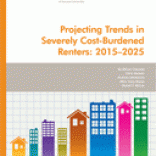U.S. Rental Housing Crisis Projected to Grow with Households Paying More than 50 Percent of Income on Rent Topping 13 Million by 2025

CAMBRIDGE, MA. – The number of households spending more than 50 percent of their income on rent is expected to rise at least 11 percent from 11.8 million to 13.1 million by 2025, according to new research by Harvard University’s Joint Center for Housing Studies (JCHS) and Enterprise Community Partners Inc (Enterprise). Released today, Projecting Trends in Severely Cost-Burdened Renters: 2015-2025 paints a bleak picture of a growing renter affordability crisis, with the largest increases expected among older adults, Hispanics and single-person households. The findings suggest that even if trends in incomes and rents turn more favorable, a variety of demographic forces—including the rapid growth of minority and senior populations—will exert continued upward pressure on the number of severely cost-burdened renters.
“Our analysis shows that even in the unlikely event that income growth greatly outpaces rent gains, the number of severely cost-burdened renters will remain near current record levels,” said Christopher Herbert, managing director of Harvard’s Joint Center for Housing Studies. “Given these data, it is critical for policymakers at all levels of government to prioritize the preservation and development of affordable rental housing as there are simply not enough quality, affordable rental units to provide housing for the millions of households paying over half their income in rental costs.”
“America’s growing national rental housing crisis threatens our communities and livelihoods,” said Terri Ludwig, president and CEO of Enterprise Community Partners. “That’s why Enterprise has set a generational goal to end housing insecurity in the U.S. by creating and preserving more high-quality affordable housing with connections to jobs, good schools, transit and health care, beginning with our down payment to help provide opportunity to 1 million families by 2020.”
Projecting Trends in Severely Cost-Burdened Renters
Under the report’s base case scenario for 2015-2025, the number of severely burdened households aged 65-74 and those aged 75 and older rise by 42.1 percent (830,000 to 1.2 million) and 38.9 percent (890,000 to 1.2million); the number of Hispanic households with severe renter burdens increases 27.3 percent (2.6 million to 3.4 million); and the number of severely burdened single-person households jumps by 12.0 percent (5.1 million to 5.7 million).
The need for affordable housing is already overwhelming the capacity of federal, state and local governments to supply assistance. At last measure, 11.2 million extremely low-income households competed for 7.3 million homes affordable to them – a 3.9 million home shortfall, and just over a
quarter of eligible very low-income households received rental assistance, leaving 7.7 million unassisted very low-income renters with worst case housing needs in 2013 according to HUD.[i] Meanwhile, the private sector is unable to supply new homes at rents low enough to reach low-income renters: The median rent of a newly constructed apartment of $1,290 was equal to about half the median renter’s monthly household income, underscoring the urgent need for policymakers to consider enhanced levels of support for rental housing particularly for lowest-income households but also across a range of income levels.
“This Harvard-Enterprise research shows how people aged 50 and over will become increasingly vulnerable to the growing rental housing crisis,” said Doris Koo, AARP board member and former president and CEO of Enterprise Community Partners. “As defined pension plans and other sources of retirement income shrink or disappear, it’s of utmost importance to increase the supply of affordable housing so that seniors have a stable, affordable place to call home.”
For more information, click here to read the full report and view the data.
###
Enterprise works with partners nationwide to build opportunity. We create and advocate for affordable homes in thriving communities linked to good schools, jobs, transit and health care. We lend funds, finance development and manage and build affordable housing, while shaping new strategies, solutions and policy. Over more than 30 years, Enterprise has created nearly 340,000 homes, invested $18.6 billion and touched millions of lives. Join us at www.EnterpriseCommunity.com or www.EnterpriseCommunity.org.
The Harvard Joint Center for Housing Studies advances understanding of housing issues and informs policy. Through its research, education and public outreach programs, the center helps leaders in government, business and the civic sectors make decisions that effectively address the needs of cities and communities. Through graduate and executive courses, as well as fellowships and internship opportunities, the Joint Center also trains and inspires the next generation of housing leaders. Visit https://www.jchs.harvard.edu and follow JCHS on Twitter @Harvard_JCHS.
Press Contacts:
Jon Searles
202.649.3916
[email protected]
Kerry Donahue
617.495.7640
[email protected]
[i] http://www.huduser.org/portal//Publications/pdf/WorstCaseNeeds_2015.pdf
